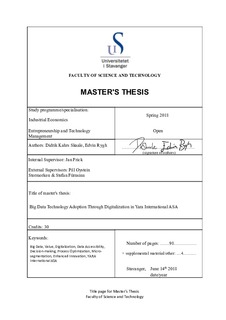| dc.contributor.advisor | Frick, Jan | |
| dc.contributor.author | Skaale, Didrik Kahrs | |
| dc.contributor.author | Rygh, Edvin | |
| dc.date.accessioned | 2018-10-04T07:47:21Z | |
| dc.date.available | 2018-10-04T07:47:21Z | |
| dc.date.issued | 2018-06-14 | |
| dc.identifier.uri | http://hdl.handle.net/11250/2566299 | |
| dc.description | Master's thesis in Industrial Economics | nb_NO |
| dc.description.abstract | As digital technologies keep evolving at great speed, our ability to store, extract and analyze data is rapidly improving. Big data is a popular term that is used to describe large and complex datasets that is generated through a variety of internal and external sources. As the volume, variety and velocity of data keeps increasing, traditional analytical methods are stretched to new limits. This thesis argues that increased capability to handle data can lead to great opportunities for well-established organizations. However, the thesis acknowledges that there are several barriers that organizations need to overcome to reap the benefits of their data assets. The thesis builds on the assumption that Yara has great opportunities to strengthen their big data capabilities and thus unlock large values, and aim to answer the following research questions:
RQ1: What is the current state of big data technology adoption through digitalization in Yara?
RQ2: What should be emphasized in the coming years to unlock potential value from big data?
This qualitative study answers the first research question by conducting 12 semi-structured interviews, measuring the state of five big data value drivers identified in a literature study. The findings are relatively unambiguous and indicate that Yara are at an early stage of adopting big data technologies. The thesis identifies increased data accessibility as a catalyst for other value drivers, and observes several issues related to how data is made available and accessed.
The second research question is answered by analyzing the transcripts in relation to theory and proposing suggestions. It is found that a higher level of big data technology adoption should allow Yara to utilize their data for increased value creation in five broadly applicable value drivers. Although the investigation of the current state of big data adoption in Yara indicates that Yara is at an early stage of big data technology adoption, the thesis argues that Yara could increase their utilization of data quite rapidly during the coming years. By investing in data infrastructure, data governance and interconnectivity, Yara would ensure that new systems are able to communicate, and that data is more accessible. Investments in technology is, however, not enough. Yara also need to digitally mature through digital transformation. The thesis argues that it is important that Yara develop and continually update a digital strategy encompassing the entire organization. | nb_NO |
| dc.language.iso | eng | nb_NO |
| dc.publisher | University of Stavanger, Norway | nb_NO |
| dc.relation.ispartofseries | Masteroppgave/UIS-TN-IØRP/2018; | |
| dc.rights | Navngivelse 4.0 Internasjonal | * |
| dc.rights.uri | http://creativecommons.org/licenses/by/4.0/deed.no | * |
| dc.subject | big data | nb_NO |
| dc.subject | value | nb_NO |
| dc.subject | digitalization | nb_NO |
| dc.subject | data accessibility | nb_NO |
| dc.subject | decision making | nb_NO |
| dc.subject | process optimization | nb_NO |
| dc.subject | micro-segmentation | nb_NO |
| dc.subject | enhanced innovation | nb_NO |
| dc.subject | yara international asa | nb_NO |
| dc.subject | industriell økonomi | nb_NO |
| dc.subject | industrial economics | nb_NO |
| dc.title | Big Data Technology Adoption Through Digitalization in Yara International ASA | nb_NO |
| dc.type | Master thesis | nb_NO |
| dc.subject.nsi | VDP::Teknologi: 500 | nb_NO |
| dc.subject.nsi | VDP::Samfunnsvitenskap: 200::Økonomi: 210 | nb_NO |

